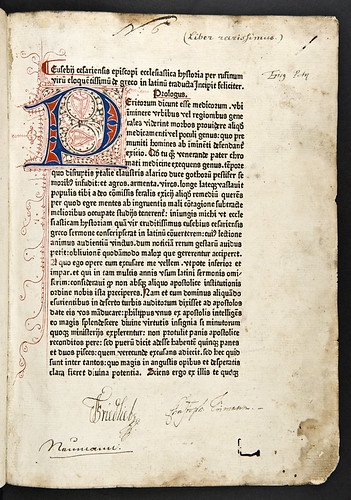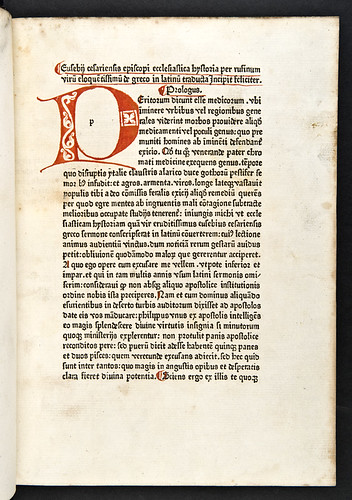Eusebius Caesariensis: Historia ecclesiastica.
Translated by Rufinus Aquileiensis.
[Utrecht: Nicolaus Ketelaer and Gerardus de Leempt], 1474.
Fol. [1-710 8-108 11-1410 15-168 17-2010 21-228]. [206] leaves (1/1, 22/8 blank).
ISTC ie00124000; GW 9434; Goff E124; BMC IX 6 (IB. 47033); Bod-inc E-041; CIBN E-97.
Two copies held by the University of Glasgow.
Copy 1
| GIP number: | E9/1 |
| Shelf-mark: | Sp Coll BD7-d.23 (see main library entry for this item) |
| Note: | Printer's pin-holes occasionally visible. |
| Provenance: | Engelbertus Jonae (15th/16th century): slip of paper affixed to front pastedown with inscription “Engelbertus Jonae noruegianus”. Jo(h)annes Moeselaer (d. 1499), Bachelor of Theology, Professor at Louvain, Rector 1482 (cf. Paul Needham, IPI): inscription on front free endpaper: “Ex legato magistri Ioannis Moeselaer cuius anima requiescat in pace Conrardus Boeghem”. Conrardus Boeghem (15th/16th century): see above. Ericus Petri (16th century): inscription on 1/2r “Ericus Petrj(?)” Friedlieb (18th century): inscription on 1/2r “Friedlieb”. Christoph Frimann (19th century): inscription on 1/2r “Christoph. Frimann”. Neumann (19th century): inscription on 1/2r “Neumann”. Edward Knight (fl. 1857-1874), bookseller, Islington, London: sold book to William Euing. William Euing (1788-1874), insurance broker, Glasgow: purchased from Knight 27 Mar. 1857 according to Euing’s pencil acquisition note with price code on front pastedown “27-3-57 Knight fe/” together with his inventory number “No 4” and an earlier inventory number "108"; source confirmed in Euing’s acquisitions inventory (University of Glasgow Library, MS Euing 49). University of Glasgow: presented by Euing in 1872 according to University Library bookplate on front pastedown. |
| Binding: | Low Countries(?), 16th-century blind-tooled calf over bevelled wooden boards; both covers identically decorated with intersecting triple fillets to form a centre panel, which is divided by triple fillets into lozenges and triangles; modern gilt spine titles; evidence from nail holes of two clasps (both now lost); modern flyleaf inserted at rear. Size: 293 x 220 mm. |
| Leaf size: | 289 x 212 mm. |
| Annotations: | Frequent marginal annotations in several 16th/17th-century hands; occasional underlining; early manuscript signatures at extreme lower right-hand corner of many leaves (some cropped by binder); deleted and erased annotations on front free endpaper; on 1/2r “Liber rarissimus” and an 18th-century(?) shelfmark “N: 6”. |
| Decoration: | Eight line initial “P” on 1/2r supplied in blue and red with reserved white and set on a square ground of red and green pen-work, with red pen-work extending into the inner margin; six-line initial “S” on 2/1r (f. 11r) supplied in gold on a blue and pink square ground decorated with tracery, and with floral decoration in green and gold extending into the inner margin; principal initial at the beginning of each of the eleven books of the Historia ecclesiastica supplied in blue with reserved white (the white of the initial “I” of book I has been filled in with brown ink); all other initials, paragraph marks and capital strokes supplied in red throughout. |
| Imperfections: | Wanting the blank leaves 1/1 and 22/8. |
Copy 2
| GIP number: | E9/2 |
| Shelf-mark: | Sp Coll Hunterian Bw.2.16 (see main library entry for this item) |
| Note: | Printer's pin-holes occasionally visible. |
| Provenance: | Louis Jean Gaignat (1697-1768), Secretary to King Louis XV: Gaignat sale, 1769; lot 2701 in Guillaume de Bure, Bibliographie instructive: supplément ... ou catalogue des livres de feu M. L.J. Gaignat, 2 vols (Paris: 1769). NB according to the Bibliothèque Méjanes annotated copy (Res. O. 189) of the Gaignat sale catalogue, Gaignat bought the book for 47 livres 16 sous. William Hunter (1718-1783), physician and anatomist: purchased by Hunter at the Gaignat sale through his agent, Jean-Baptiste Dessain, for 30 livres; see Dessain-Hunter correspondence (University of Glasgow Library, MS Gen. 36, f. 23v). University of Glasgow: Hunterian bequest, 1807; Hunterian Museum bookplate on front pastedown, with former shelfmark “B.7.12”. |
| Binding: | France, 18th-century blue goatskin; covers decorated with a triple gold-fillet border, a small gold fleuron at each corner; gold-tooled spine; marbled endpapers; gilt-edged leaves; pink silk bookmark. Size: 290 x 210 mm. |
| Leaf size: | 281 x 199 mm. |
| Annotations: | Occasional marginal annotations (washed out) in quires 21 and 22; occasional single word corrections. |
| Decoration: | Principal initials supplied in red with reserved white; other initials, paragraph marks and capital strokes supplied in red throughout; chapter headings underlined in red throughout. |
| Imperfections: | Wanting the blank leaves 1/1 and 22/8. |











